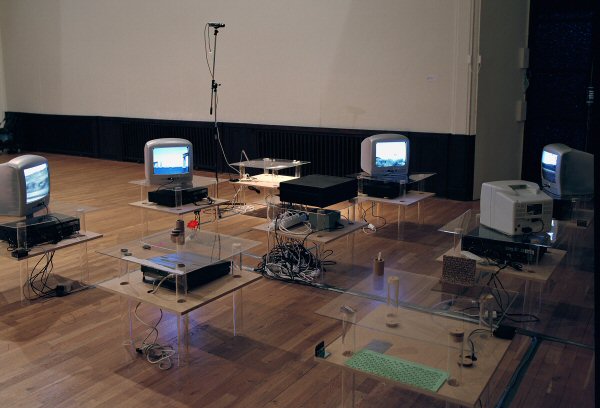Please wait a few moments while we process your request

Creative Room for Art and Computing
CRAC in Context: The RAM Room
(Stockholm, Sweden)
The Foundation has supported CRAC in Context: The RAM Room, a space reserved for projects from the e-zine CRAC in Context. Begun in 1998 in Stockholm by Creative Room for Art and Computing (CRAC), CRAC in Context encompasses an on-line publication, text archives, and Web art projects. In line with CRAC's goals, the editorial objective of this e-zine, dedicated to contemporary art and research into new technologies, is to merge art, technology and research in our information society. Thanks to funding granted to the workshop Re-approaching New Media (RAM) from the European Commission's cultural program, CRAC relaunched its e-zine in November 2002. Essentially, the RAM Room concept involves showcasing, distributing and developing the results of the RAM workshops.
RAM is an interdisciplinary initiative that brings together CRAC (Sweden), RIXC (Latvia), Vilma/Jutempus (Lithuania), Atelier Nord (Norway), E-media Centre (Estonia), and Olento (Finland). Organized by these new media artist centres, the RAM workshops seek to create an international network of new media professionals, to address critical topics, and to develop new approaches and tools for producing new media. In total, six workshops are offered until December 2004. The workshops are held in the various European countries where the participating artist centres are found.
The RAM Room concept is a synthesis of a mailing list, workshop, publication, archives and exhibition space. The RAM Room is a new formula inspired by experiences that have developed out of cultural practices relying on new media. This experimentation space offers a permanent network base created by the participating groups. The results of the workshops are available on-line. An independent entity, the RAM Room is linked to each publication and workshop. Its main focus is to manage co-productions, exhibitions of prototypes, and the work carried out within each workshop. The exhibitions are presented on-line as well as in collaboration with museums and other exhibition spaces.
The RAM Room was launched in December 2002, at the same time as the first electronic issue of CRAC in Context. In November 2002, CRAC hosted the first workshop titled Representation and Control Interaction in Computer Games. In keeping with the workshop's theme, the RAM Room is devising a structure to experiment artistically with software designed according to the principles of the open source codes used in multi-player games on-line. During December 2002, an initial exhibition (held at the Baltic Art Centre in Visby, Sweden) presented the end results of the first workshop. The activities of the RAM Room are therefore developed out of the workshops.
The creation of new interfaces for the Web was the theme of the second workshop. This was held in February 2003 in Oslo, Norway, and Atelier Nord presented Net art projects. The E-media Centre in Tallinn, Estonia, organized the third workshop, New Utopias/New Visions - Claiming Cultural Territory in New Media. The RAM Room seeks strategies inspired by discourse favouring the cultural independence of new media. In October 2003, Olento presented the workshop Survival Kit for the New Media and Communication Environment in Helsinki, Finland. The RAM Room has distributed prototypes from this survival kit. In May 2004, RIXC hosted the fifth workshop, Media Architecture: Managing Interactive Processes Between Physical and Virtual Environments, in Riga, Latvia. In this workshop, the RAM Room has conducted architectural experiments in a local and virtual environment.
Finally, Vilma will organize the sixth and final workshop in Vilnius, Lithuania, in September 2004. Titled Social Interaction and Collective Intelligence: Method Approach and Strategy, this workshop will produce a structure enabling new media artists to appropriate concepts from the social and community arena so as to integrate them into their projects.
RAM is an interdisciplinary initiative that brings together CRAC (Sweden), RIXC (Latvia), Vilma/Jutempus (Lithuania), Atelier Nord (Norway), E-media Centre (Estonia), and Olento (Finland). Organized by these new media artist centres, the RAM workshops seek to create an international network of new media professionals, to address critical topics, and to develop new approaches and tools for producing new media. In total, six workshops are offered until December 2004. The workshops are held in the various European countries where the participating artist centres are found.
The RAM Room concept is a synthesis of a mailing list, workshop, publication, archives and exhibition space. The RAM Room is a new formula inspired by experiences that have developed out of cultural practices relying on new media. This experimentation space offers a permanent network base created by the participating groups. The results of the workshops are available on-line. An independent entity, the RAM Room is linked to each publication and workshop. Its main focus is to manage co-productions, exhibitions of prototypes, and the work carried out within each workshop. The exhibitions are presented on-line as well as in collaboration with museums and other exhibition spaces.
The RAM Room was launched in December 2002, at the same time as the first electronic issue of CRAC in Context. In November 2002, CRAC hosted the first workshop titled Representation and Control Interaction in Computer Games. In keeping with the workshop's theme, the RAM Room is devising a structure to experiment artistically with software designed according to the principles of the open source codes used in multi-player games on-line. During December 2002, an initial exhibition (held at the Baltic Art Centre in Visby, Sweden) presented the end results of the first workshop. The activities of the RAM Room are therefore developed out of the workshops.
The creation of new interfaces for the Web was the theme of the second workshop. This was held in February 2003 in Oslo, Norway, and Atelier Nord presented Net art projects. The E-media Centre in Tallinn, Estonia, organized the third workshop, New Utopias/New Visions - Claiming Cultural Territory in New Media. The RAM Room seeks strategies inspired by discourse favouring the cultural independence of new media. In October 2003, Olento presented the workshop Survival Kit for the New Media and Communication Environment in Helsinki, Finland. The RAM Room has distributed prototypes from this survival kit. In May 2004, RIXC hosted the fifth workshop, Media Architecture: Managing Interactive Processes Between Physical and Virtual Environments, in Riga, Latvia. In this workshop, the RAM Room has conducted architectural experiments in a local and virtual environment.
Finally, Vilma will organize the sixth and final workshop in Vilnius, Lithuania, in September 2004. Titled Social Interaction and Collective Intelligence: Method Approach and Strategy, this workshop will produce a structure enabling new media artists to appropriate concepts from the social and community arena so as to integrate them into their projects.
Dominique Fontaine © 2004 FDL









